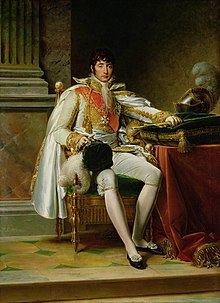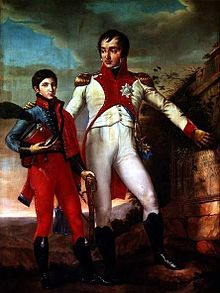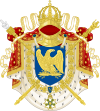Louis Bonaparte
| Louis Bonaparte | |||||
|---|---|---|---|---|---|
Louis II | |||||
| Head of the House of Bonaparte | |||||
| Tenure | 28 July 1844 – 25 July 1846 | ||||
| Predecessor | Joseph, Count of Survilliers | ||||
| Successor | Napoleon III | ||||
| Born | 2 September 1778 Ajaccio, Corsica, Kingdom of France | ||||
| Died | 25 July 1846 (aged 67) Livorno, Grand Duchy of Tuscany | ||||
| Burial | , Paris | ||||
| Spouse | |||||
| Issue |
| ||||
| |||||
| House | Bonaparte | ||||
| Father | Carlo Buonaparte | ||||
| Mother | Letizia Ramolino | ||||
| Religion | Roman Catholicism | ||||
| Signature | |||||
Louis Napoléon Bonaparte (born Luigi Buonaparte; 2 September 1778 – 25 July 1846) was a younger brother of Napoleon I, Emperor of the French. He was a monarch in his own right from 1806 to 1810, ruling over the Kingdom of Holland (a French client state roughly corresponding to the modern-day Netherlands). In that capacity, he was known as Louis I (Dutch: Lodewijk I [ˈloːdəʋɛik]).
Louis was the fifth surviving child and fourth surviving son of
In 1806, Napoleon established the Kingdom of Holland in place of the Batavian Republic, appointing Louis as the new king. Napoleon had intended for Holland to be little more than a puppet state, but Louis was determined to be as independent as possible and became quite popular amongst his new people. Growing tired of his brother's wilfulness, Napoleon annexed Holland into the French Empire in 1810, and Louis went into exile.
His youngest son, Louis-Napoléon, established the Second French Empire in 1852, proclaiming himself Napoleon III.
Early life
Louis was born in
Louis Bonaparte's early career was spent in the Army, and he served with Napoleon in
Upon Louis's return to France, he was involved in Napoleon's plot to overthrow the Directory. After becoming the First Consul, Napoleon arranged for a marriage between Louis and Hortense de Beauharnais, the daughter of Empress Josephine, and hence Napoleon's stepdaughter. Hortense, who was opposed to the marriage at first, was persuaded by her mother to marry Louis for the sake of the family, and she did so.
King of Holland (1806–1810)


Feeling that the Batavian Republic was too independent for his liking, Napoleon replaced it with the Kingdom of Holland on 5 June 1806 and placed Louis on the throne. Napoleon had intended for his younger brother to be little more than a French prefect of Holland. However, Louis had his mind and tried to be a responsible and independent ruler. To endear himself to his adopted country, he tried to learn the Dutch language; he called himself Lodewijk I (adopting the Dutch form of his name) and declared himself Dutch rather than French.[2][3] Allegedly, his Dutch was initially so poor that he told the people he was the Konijn van 'Olland ("Rabbit of 'Olland"), rather than Koning van Holland ("King of Holland"). However, his sincere effort to learn Dutch earned him respect from his subjects.

Having declared himself Dutch, Louis tried to make his court Dutch as well. He forced his court and ministers (mostly provided by Napoleon) to speak only Dutch and to renounce their French citizenships. This latter was too much for his wife Hortense who, in France at the time of his demands, refused his request. Louis and Hortense had never gotten along, and this demand further strained their relationship. She only came to Holland reluctantly and deliberately tried to avoid Louis as much as possible.
Louis could never settle on the location of his capital city while he was in Holland. He changed capitals over a dozen times, trying Amsterdam, The Hague, Utrecht, and other places. On one occasion, after visiting the home of a wealthy Dutch merchant, he liked the place so much that he had the owner evicted so he could take up residence there. Then, Louis moved again after seven weeks. His constant moving kept the court in upheaval since they had to follow him everywhere. The European diplomatic corps went so far as to petition Bonaparte to remain in one place so they could keep up with him.
Hortense bore Louis's sons

Two major tragedies occurred during the reign of Louis Bonaparte: the explosion of a cargo ship loaded with gunpowder in the heart of the city of Leiden in 1807, and a major flood in Holland in 1809. In both instances, Louis personally and effectively oversaw local relief efforts, which helped earn him the title of Louis the Good. Napoleon appeared disappointed and commented: ″Brother, when they say of some king or other that he is good, it means that he has failed in his rule.″[4]
Louis Bonaparte's reign was short-lived due to two factors. The first was that Napoleon wanted to reduce the value of French loans from Dutch investors by two-thirds, meaning a serious economic blow to the Netherlands. The second became the pretext for Napoleon's demand of Louis's abdication. As Napoleon was preparing an army for his invasion of Russia, he wanted troops from the entire region under his control, this included troops from the Netherlands. Louis, confronted by his brother's demand, refused point-blank. Napoleon then accused Louis of putting Dutch interests above those of France, and removed most of the French forces in Holland for the coming war in the east, leaving only about 9,000 garrison soldiers in the country. Unfortunately for Louis, the English landed an army of 40,000 in 1809 in
Exile

After his abdication, Louis Bonaparte assumed the title of Count of Saint-Leu (comte de Saint-Leu),[6] which was a reference to his property at Saint-Leu-la-Forêt near Paris.[7] He was appointed as the Constable of France in 1808, a strictly honorary title.
After his Dutch kingdom was taken away from him, the
After the death of his eldest brother Joseph in 1844, Louis was seen by the
Louis Bonaparte died on 25 July 1846 in Livorno, and his remains were buried at Saint-Leu-la-Forêt, Île-de-France.
Marriage and children

Louis was married on 4 January 1802 to
This marriage had been forced upon them and was rather loveless, though they supposedly consummated it and interacted often enough to produce three sons. As a rule, the Bonapartes, except Napoleon, loathed the Beauharnaises. Hortense also certainly had extra-marital lovers.[9]
Hortense de Beauharnais gave birth to three sons who were officially claimed by Louis Bonaparte, despite his doubts about their paternity:
- Napoleon Charles Bonaparte, born 10 October 1802, Prince Royal of Holland. When he died on 5 May 1807 at 4½ years of age, his body lay in state at Notre Dame Cathedralin Paris. He is buried at Saint-Leu-La-Foret, Ile-de-France.
- Napoleon Louis Bonaparte, born 11 October 1804. Became Prince Royal of Holland on his brother's death, and was King for eight days in 1810, between his father's abdication (1 July) and the fall of Holland to Napoleon Bonaparte's invading army (9 July). Sovereign of the Grand Duchy of Berg in 1809-1813 (under regency). Napoleon Louis Bonaparte died from measleson 17 March 1831, and his remains were buried at Saint-Leu-La-Foret, Île-de-France.
- Charles Louis-Napoleon Bonaparte, (1808–73). Born in Paris, he was the third and last son, and became Sovereign of the Second French Empire (1852–1870) as Emperor Napoleon III.
References
- ^ Frédéric Masson – Napoleon dans se jeunesse – Société d'Éditions Littéraires et Artistiques – Paris, 1907 – page 42
- ISBN 978-3319495897.
- ISBN 978-0-87436-957-1.
- ^ Tarle, Yevgeny (1937). Bonaparte. New York: Knight Publications. p. 95.
- ISBN 978-1137455475.
- ^ Geer, Walter (1929). Napoleon and His Family: Moscow-Saint Helena, 1813–1821. Allen & Unwin. p. 7.
- ^ Foissy, M. (1830). La famille Bonaparte depuis 1264 (in French). Paris: Vergne. p. 130.
- ^ Bonaparte, Louis (1829). Reponse à sir Walter Scott, sur son histoire de Napoleon (in French). Paris: C.J. Trouve. p. 1.
- ^ McMillan
Further reading
- Alan Schom (1998). Napoleon Bonaparte: A Life. ISBN 978-0-06-092958-9.


